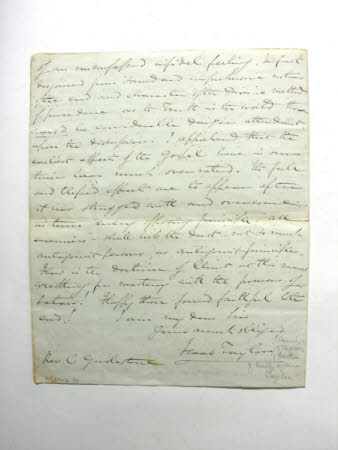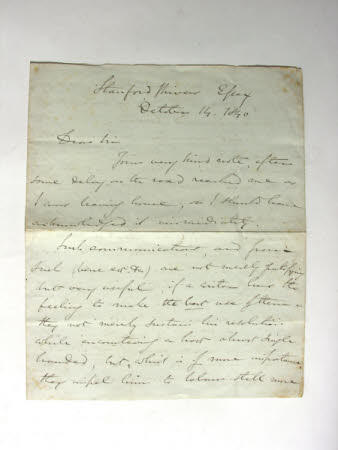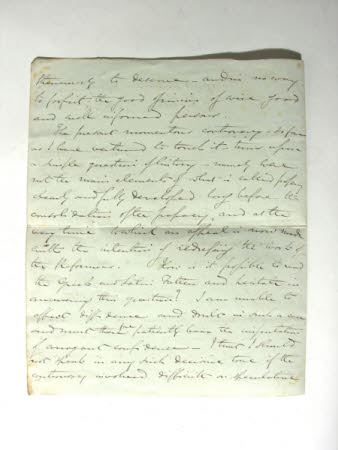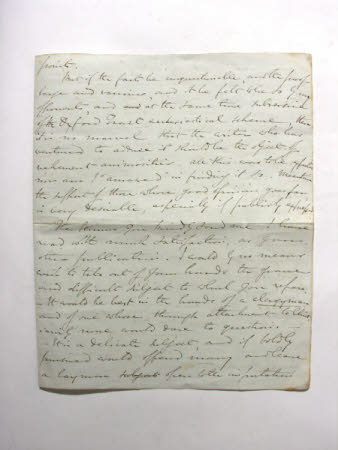Letter
Category
Manuscripts and documents
Date
Unknown
Materials
Paper
Measurements
455 x 278 mm
Order this imageCollection
Tyntesfield, North Somerset
NT 27412.39
Summary
Four page letter from Rev. C. Grindlestone and Isaac Taylor to Stanford Rivers.
Full description
Letter from Stanford Rivers Eley October 14 1890 Dear Sir Your very kind note, after some delay on the road, reached me as I was leaving home, or I should have acknowledged it immediately. Such communications, and from such [……..] are not merely gratifying but very useful, if a writer has a feeling to make the best use of them. They not merely sustain his resolution while encountering a [….] almost single handed, but, which is of more important. They impel him to labour more thoroughly to deserve and in no way to forfeit the good opinions of wise good and well informed persons. The present momentous controversy so far as I have ventured to touch it – times upon a simple question of history – namely were not the main elements of which is called profacy clearly and fully developed long before the consolidation after profacy and at the very time to which an appeal is now made with the intention of redefining the work of the reformer. How is it profible to read the Greek and Latin Fathers and hesitate in answering this question? I am unable to affect diffidence and [….] in such a case and must therefore patiently been the […….] of arrogant confidence – I think I should not speak in any such deceive tone if the controversy involved difficult and speculative [……] But if the facts be unquestionable, and the proof large and various, and it be felt to be to [….] [……], and at the same time […….] of the Oxford Trust ecclesiastical scheme, then it is no marvel that the writer who has ventured to advise it should the object of the vehement animosities. All this was to be expected now am I “amazed” in finding it so. Meantime the support of those whose opinions goes far, is very desirable, especially publicly expressed. The sermon you kindly sent me I have read with much satisfaction, as James’s other publications. I would [G…..] no means wish to take out of James’s hands the grave and difficult subject to which you refer. – It would be best in the hands of a clergyman and of one whose thorough attachment to Christianity non would dare to question. – It is a delicate subject, and if boldly pursued would offend many and leave a layman (subject) (which is crossed out) open to the […..] of an […….] infidel feeling. In fact disjoined from sound and comprehensive notion of the end and character of the Divine methods of procedure as to Truth in the world there would be considerable danger attendant upon the discussion. I apprehend that the earliest affect of the Gospel have in our times been much overrated. Its full and [….] effects are to appear after it has struggled with and overcome in times every offering principle – “all enemies” – shall lick the dust – not so much antagonist persons, as antagonist principles. How is the doctrine of Christ at this moment [……] for mastery with the powers of satan! Happily those friends faithful to the end! I am my dear sir Yours much obliged Isaac Taylor Rev. C. Grindlestone (written in pencil) senior, - of [……] brother of Emily and Jane Taylor
Provenance
Purchase from the estate of the late Lord Wraxall with the assistance of the NHMF and donations from members and supporters.



